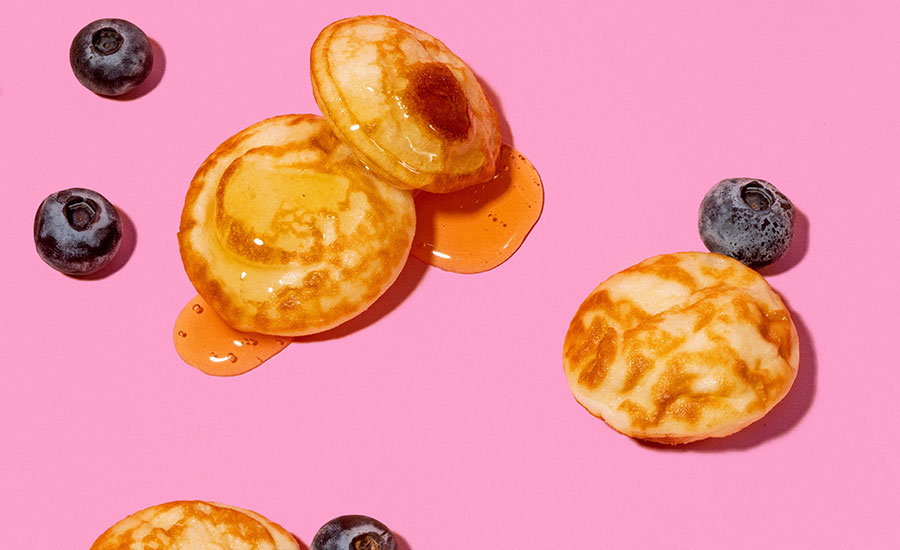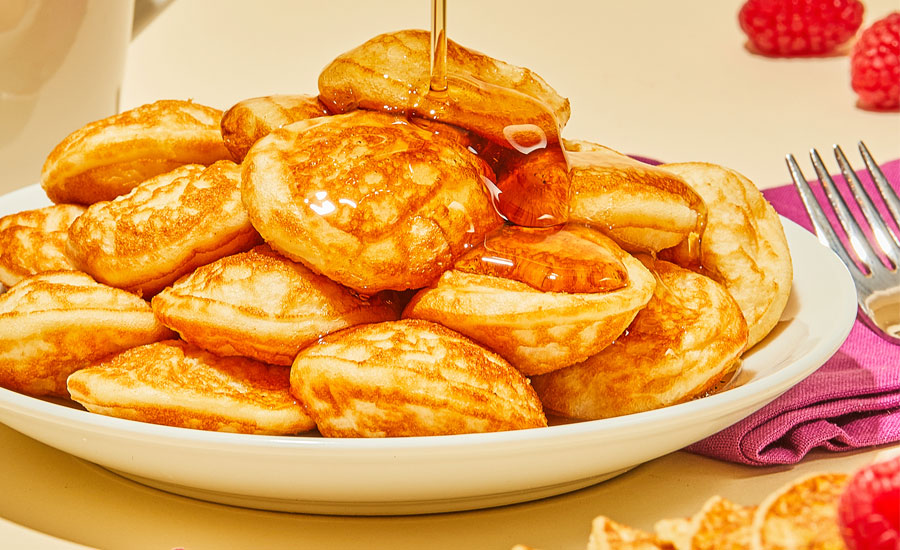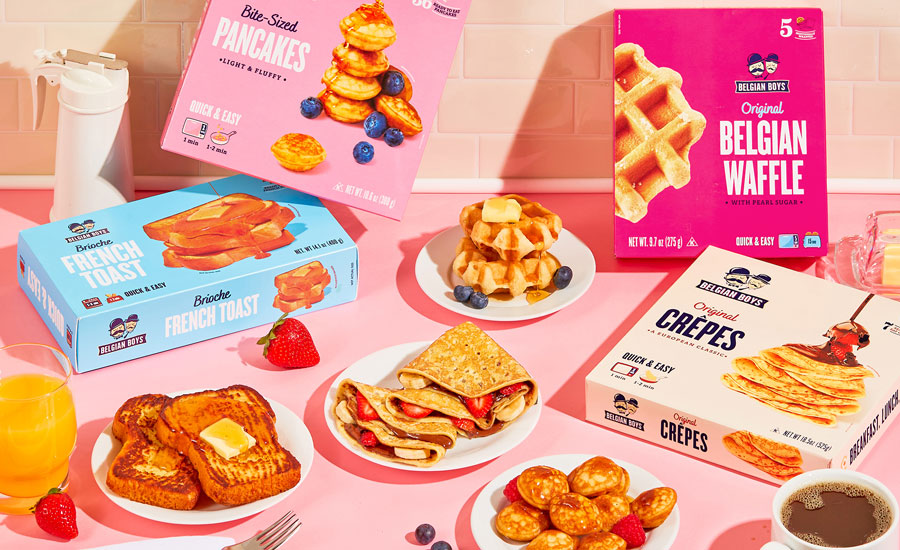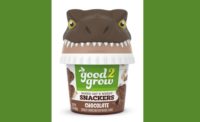Heat-and-serve breakfast goods are not unfamiliar to U.S. consumers. However, when consumers are hungry for such easy morning treats or snacks, they usually need to head to the freezer section or ambient shelves.
Belgian Boys, New York City, is taking heat-and-eat breakfast into relatively unfamiliar territory, at least for U.S. consumers: the refrigerated case. Joining its line of cookies, stroopwafels, and other sweet treats, the Belgian waffles, newly launched French toast, crepes, and mini pancakes have been attracting a growing number consumers looking for morning munches with fresh-made taste and European flair.
CEO and co-founder Anouck Gotlib says that while refrigerated breakfast items might be a relative novelty for Americans, they are more familiar to European consumers.
“One of the major differences is that ready-made, convenient, and delicious breakfast items and baked goods are widely available in the refrigerated aisles of the grocery stores in Europe,” she says. “Consumers are used to just heating and eating these for a quick breakfast or snack.”
However, thanks to Belgian Boys, U.S. consumers are catching on to refrigerated heat-and-serve breakfast items. Its sales have been on the climb, and its track record has attracted the attention of investors like Daniel Lubetzky, the billionaire behind the snack bar giant KIND Snacks.
The beginning
Before Belgian Boys began, Gotlib and entrepreneur husband Greg Galel picked up and moved from Belgium to New York City. Soon, they noted that while their new home might be known around the globe for being a culinary mecca, the Big Apple’s menu was missing a few items—namely, the crepes, stroopwafels, waffles, and other baked treats for which Belgium is known. Feeling homesick for the breakfast foods of their childhood, the pair set to bringing the tastes of her country to the States. In 2015, Belgian Boys was born. Gotlib credits Galel for being the driving force.
“Greg has always been an entrepreneur; he tried another business idea or two before launching Belgian Boys,” relates Gotlib. “It was his vision and courage that are the reasons our company exists.”
Gotlib relates the company kicked off with some familiar favorites and cultural staples, including stroopwafels. At the time, Gotlib was busy making a name for herself in the fashion business. By day, she toiled away at a company near the Garment District at 42nd Street and Fashion Avenue. At night, she worked on the burgeoning food company’s logo, branding, and packaging.

“I like to joke that I was ‘dressing’ the products,” says Gotlib. “We launched with quite a few products all at once—crepes, pancakes, stroopwafels, Belgian waffles, and a few others—that were our cultural staples.”
The European edibles were a hit with consumers, and she left the fashion industry behind in 2015 to focus on growing Belgian Boys full-time.
U.S. vs. Europe
Gotlib says while the brand originated from the nostalgia she and Galel felt for Belgian foods, they found that the typical American consumers they were trying to connect with didn’t share that same warm, fuzzy feeling.
“When we moved here we didn’t understand why the consumer would buy something they eat every single day and stock their freezer with it,” Gotlib reveals. “Pancakes, crepes, French toast, and waffles are foods you go through on a daily basis if you’re feeding a family of four.”
However, Belgian Boys saw opportunities to fulfill some of U.S. consumers’ desires while introducing them to a few new things.

“We realized our typical consumer hadn’t been to Europe, but they were looking for delicious, convenient foods that they could feel good about serving their families,” she says. “Our product lineup shifted to focus on making products with a European ‘twist’ for families looking for something delicious, quick, easy, and convenient.”
Taking chances
The company built upon its existing lineup, largely products nestled on ambient shelves, and started eying new territory. Belgians are renowned for baked breakfast items—its namesake Belgium waffles, for starters, as well as crepes, French toast, and tiny pancakes (which are more three-dimensional than your standard flat flapjacks). However, while most ready-to-eat breakfast options can be found in the freezer section, Gotlib and Galel felt the quality of the products would be better suited to the refrigerated case.
While boldly going where no breakfast had gone before was a risk, the team was confident the invasion of U.S. refrigerated cases would succeed.
“In large part, it was our gut,” Gotlib explains. “We knew that this was commonplace and worked well for shoppers in Europe, because it was where we grew up it seemed so natural to us.”
Also, Gotlib muses, the location makes sense when factoring in where shoppers find other common items for morning meal preparation.
“Shoppers can find easy-to-prepare breakfast options right alongside other staples like eggs, yogurt, milk, and orange juice. Why go all across the store to the frozen set for breakfast staples?” she says.
Keeping confident
While they had a positive outlook about its chances of eventual success at the outset, the Belgian Boys team faced a lot of naysayers along the journey.
“Buyers at all types of stores from specialty to mass kept telling us that Americans bought their breakfast pastries frozen,” Gotlib says. “They didn’t want to take the risk of giving away facings of guaranteed-movers like eggs and yogurt, plus frozen breakfast was a strong category.”
Despite a long string of “no” from potential partners, the Belgian Boys team remained persistent—though staying confident was not always easy.
“I have come to understand that a ‘no’ means it isn’t the right opportunity or the right time for that buyer, retailer or investor,” she confides. “In some cases that is because we weren’t giving them enough proof or perhaps they couldn’t afford to take a risk. You have to understand that in order to not take the ‘no’s personally and understand the why behind them and use that to actually go out and work towards a yes.”
Then, the ‘yes’es started coming. The company successfully tested its products at Costco in 2018, where the crepes and pancakes had a strong performance. Buyers from Walmart launched the refrigerated products at 65 Walmart locations. Those early successes proved a springboard for more.

“We used initial data to convince the naysayers that it was time to give us a shot,” Gotlib says. “Since then, we’ve gained over 3,000 points of distribution in refrigerated breakfast—and growing.”
Lessons learned
Along the path from launch to growth, Gotlib says, the team learned a number of lessons.
“From operations to supply chain and coordination, we had so many new challenges moving into the refrigerated space,” she explains. “We learned a lot through our early failures, partnered with retailers to improve things, and improved as we went. One thing I would absolutely recommend is to start small so your mistakes are small and you know how to do things differently as you start to really expand.”
Another is mindful, creative selection of strategic partners. “Prior to the pandemic, we secured placement on JetBlue which got us in front of millions of eyeballs and was a huge driver of brand awareness,” Gotlib shares. “We parlayed that into an in-store partnership with DryBar, where we were the ‘official cookie partner’ helping to create an indulgent experience for busy women looking to treat themselves. We also launched a partnership with Misfits Market in 2021 with the creation of an ‘Upcycled Stroopwafel’ which sold out multiple times on their platform and introduced the Belgian Boys brand to thousands of new customers.”
As the company and its products have increased its profile, Belgian Boys has continued to forge partnerships and connect with investors.
“Alignment is the word that we valued most throughout our fundraising efforts—looking for people aligned with that vision we crafted for the business but also aligned with us,” she says. “We needed a partner who would let Belgian Boys remain our authentic selves and also let Greg and I do what we do best.”
The company sought out fellow CPG founders, angel investors, and operators that understood its vision—entities that could support them and guide them in a number of ways.

“We are big believers that asking for help is not a weakness, it’s the biggest strength to know who to ask for help, humility, gratitude, and happiness are core values to who we are and in the way we lead our company,” Gotlib says. “We wanted investors who could offer help as we grow and face challenges that many of them have personally faced before.”
What’s next
Gotlib says Belgian Boys is ready for future challenges and opportunities, heartened by past successes and the company’s ability to power through difficulties.
“When the pandemic hit, we lost almost a third of our business overnight (from airlines, foodservice accounts, etc.), but we were still able to grow by 35%, double our team, and donate more than 80,000 treats to local communities and front-line workers,” Gotlib says. “As the cherry on top, we were featured on the Inc. 5000 list, within the Top 50 Food and Beverage companies. Having thrived and even grown in the midst of a global pandemic plagued with so many business and logistical challenges is one of our biggest accomplishments.”
The company also is continuing to innovate, and look for opportunities to give back.
“We’re very excited to announce that we are launching a limited-time only product: Pancake Cereal,” Gotlib reports. “We’ve taken what started as a viral TikTok trend and turned it into a shelf-ready ‘fridge cereal,’ that will be sold exclusively at Target in February, and at Target and GoPuff in March.”
And, Gotlib says, the company, whose tagline is “Happiness Baked In,” maintains a focus on growth and positivity.
“We're passionate about creating joy for our customers, and about spreading sweetness in people's lives, and we let that inform every decision we make,” she says. “We’re a woman-owned, women-led company sparking moments of joy in people’s lives with delicious European foods. We make quick-and-easy breakfasts and individually wrapped cookies with whole food, non-GMO ingredients, so that families can prep less, smile more, and indulge better.”




